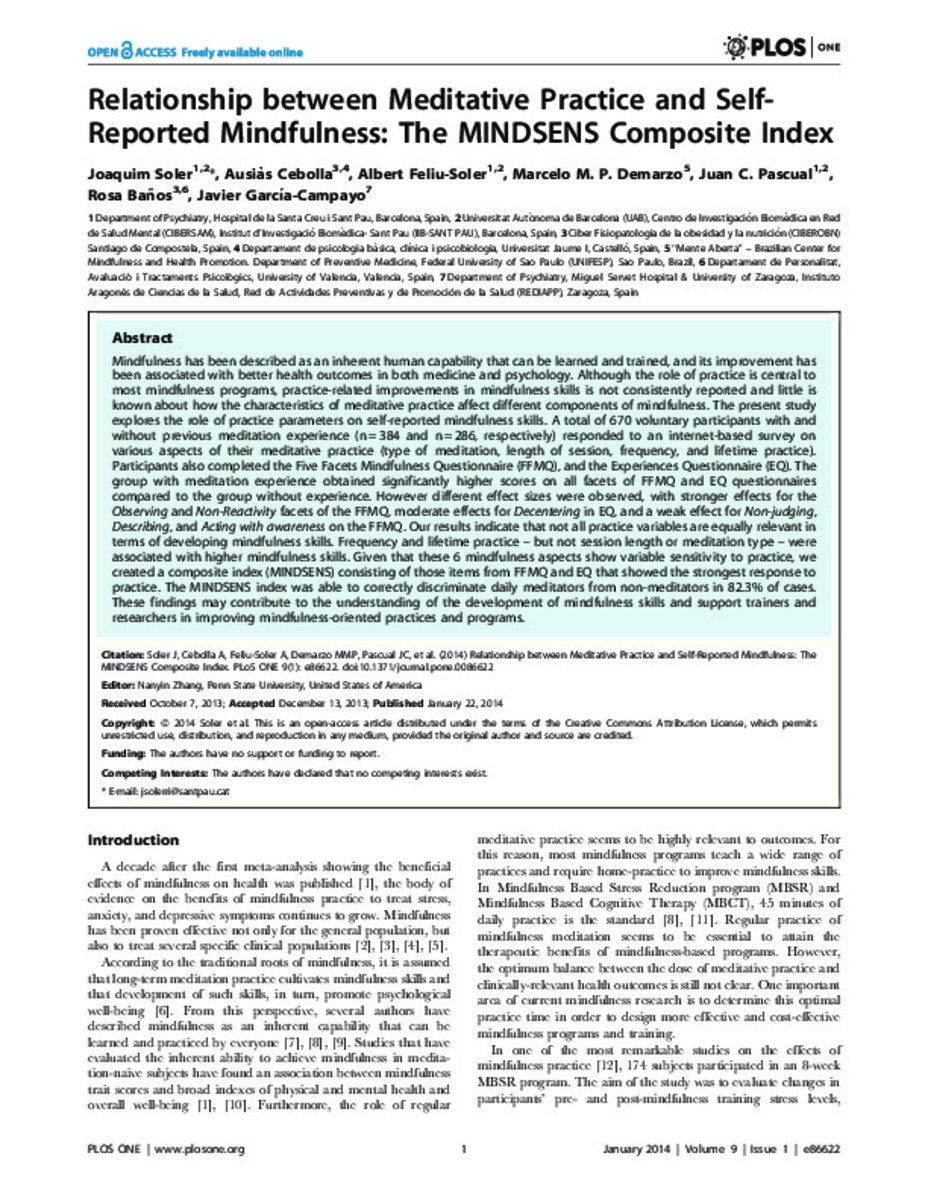Mostrar el registro sencillo del ítem
Relationship between Meditative Practice and SelfReported Mindfulness: The MINDSENS Composite Index
| dc.contributor.author | Soler Ribaudi, Joaquim | |
| dc.contributor.author | Cebolla Marti, Ausias | |
| dc.contributor.author | Feliu-Soler, Albert | |
| dc.contributor.author | Demarzo, Marcelo | |
| dc.contributor.author | Pascual, Juan Carlos | |
| dc.contributor.author | Baños, Rosa Maria | |
| dc.contributor.author | Garcia-Campayo, Javier | |
| dc.date.accessioned | 2015-06-15T14:16:04Z | |
| dc.date.available | 2015-06-15T14:16:04Z | |
| dc.date.issued | 2014 | |
| dc.identifier.citation | Soler J, Cebolla A, Feliu-Soler A, Demarzo MMP, Pascual JC, Baños R, et al. (2014) Relationship between Meditative Practice and Self-Reported Mindfulness: The MINDSENS Composite Index. PLoS ONE 9(1): e86622. doi:10.1371/journal.pone.0086622 | ca_CA |
| dc.identifier.issn | 1932-6203 | |
| dc.identifier.uri | http://hdl.handle.net/10234/123643 | |
| dc.description.abstract | Mindfulness has been described as an inherent human capability that can be learned and trained, and its improvement has been associated with better health outcomes in both medicine and psychology. Although the role of practice is central to most mindfulness programs, practice-related improvements in mindfulness skills is not consistently reported and little is known about how the characteristics of meditative practice affect different components of mindfulness. The present study explores the role of practice parameters on self-reported mindfulness skills. A total of 670 voluntary participants with and without previous meditation experience (n = 384 and n = 286, respectively) responded to an internet-based survey on various aspects of their meditative practice (type of meditation, length of session, frequency, and lifetime practice). Participants also completed the Five Facets Mindfulness Questionnaire (FFMQ), and the Experiences Questionnaire (EQ). The group with meditation experience obtained significantly higher scores on all facets of FFMQ and EQ questionnaires compared to the group without experience. However different effect sizes were observed, with stronger effects for the Observing and Non-Reactivity facets of the FFMQ, moderate effects for Decentering in EQ, and a weak effect for Non-judging, Describing, and Acting with awareness on the FFMQ. Our results indicate that not all practice variables are equally relevant in terms of developing mindfulness skills. Frequency and lifetime practice – but not session length or meditation type – were associated with higher mindfulness skills. Given that these 6 mindfulness aspects show variable sensitivity to practice, we created a composite index (MINDSENS) consisting of those items from FFMQ and EQ that showed the strongest response to practice. The MINDSENS index was able to correctly discriminate daily meditators from non-meditators in 82.3% of cases. These findings may contribute to the understanding of the development of mindfulness skills and support trainers and researchers in improving mindfulness-oriented practices and programs. | ca_CA |
| dc.format.extent | 7 p. | ca_CA |
| dc.format.mimetype | application/pdf | ca_CA |
| dc.language.iso | eng | ca_CA |
| dc.publisher | Public Library of Science | ca_CA |
| dc.relation.isPartOf | PLoS ONE, January 2014, Volume 9, Issue 1, e86622 | ca_CA |
| dc.rights | © 2014 Soler et al. This is an open-access article distributed under the terms of the Creative Commons Attribution License, which permits unrestricted use, distribution, and reproduction in any medium, provided the original author and source are credited. | ca_CA |
| dc.rights | Attribution 4.0 Spain | * |
| dc.rights.uri | http://creativecommons.org/licenses/by-sa/4.0/ | * |
| dc.title | Relationship between Meditative Practice and SelfReported Mindfulness: The MINDSENS Composite Index | ca_CA |
| dc.type | info:eu-repo/semantics/article | ca_CA |
| dc.identifier.doi | http://dx.doi.org/10.1371/journal.pone.0086622 | |
| dc.rights.accessRights | info:eu-repo/semantics/openAccess | ca_CA |
| dc.relation.publisherVersion | http://www.plosone.org/article/fetchObject.action?uri=info:doi/10.1371/journal.pone.0086622&representation=PDF | ca_CA |
| dc.type.version | info:eu-repo/semantics/publishedVersion | ca_CA |
Ficheros en el ítem
Este ítem aparece en la(s) siguiente(s) colección(ones)
-
PSB_Articles [1303]
Articles de publicacions periòdiques
Excepto si se señala otra cosa, la licencia del ítem se describe como: © 2014 Soler et al. This is an open-access article distributed under the terms of the Creative Commons Attribution License, which permits unrestricted use, distribution, and reproduction in any medium, provided the original author and source are credited.








